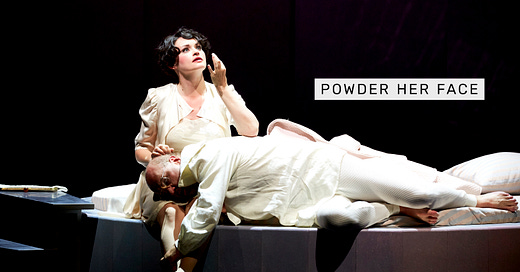"It's called Joy...And in the end, it evaporates into air, like everything."
Opera by Thomas Adès
Co-production of Nouvel Opéra Fribourg/Neue Oper Freiburg, Athénée Théâtre Louis-Jouvet, Stadttheater Schaffhausen, Théâtre du Crochetan, Fondazione Haydn di Bolzano, 2021/2022
I remember my first experience performing Powder Her Face in 2017 feeling emotionally exhausted during much of the production period, not only from having to portray characters on stage whose ethics I did not agree with, but also in having to interact with a protagonist whose narcissism, thoughtlessness and prodigality I found utterly intolerable. At the time, I had concluded that Margaret Campbell's life and persona were nevertheless worthy of an opera, because it had foreshadowed modern celebrity, and challenged audiences to consider how societal values and the behaviors of those around her bore some of the responsibility in shaping who that person was (I wrote about that previously, HERE). Having said that, the paradox between the opera being one of my favorite pieces of music, and the inability to emotionally attach myself to any of its characters, had created for me a lot of...well, dissonance!
Revisiting this opera now four and five years later, one does not have to look very far to observe multitudes of people desperately trying to live out exactly her narrative. With social media activity post-pandemic magnified exponentially, the internet provides a virtual stage with direct access, visibility and communication on a massive scale, for any aspiring icon (artist, activist, influencer, etc.) to be built up, worshiped and inevitably cancelled. Though I am very glad that Powder Her Face has become all the more relevant, if it is as Carl Jung said, that "all art intuitively apprehends coming changes in the collective consciousness", this kind of mirroring of popular culture does not exactly make one optimistic about the evolution of humanity!
I suppose one of the complexities of being an artist is in the task of reconciling several opposing truths at the same time. What makes each performer unique is in the interpretation of a role that is filtered through one's own subjective life experiences and beliefs. At the same time, it is also necessary to go outside of one's own social conditioning in order to portray characters whose choices we would not necessarily make for ourselves, AND in such a way that is in service of a composer's/director's/conductor's creative vision. Child's play, right?
Perhaps it was partly the pandemic induced stage deprivation, or that I have become more battle-hardened from the first production and from life experience since 2017, but I would like to think that having a better understanding of the social commentary that is being expressed through each character has made it easier this time around to lean into those roles without as much internal conflict. In fact, performing antagonistic characters can be quite liberating, since there is already the expectation of less social reinforcement from the public, regardless of the quality of the performance. An audience is socially driven to applaud for more virtuous characters, which gives performers portraying villains so much more freedom to "play", because it means that one is therefore released from any conscious or subconscious desire to "please" as a driving force. Operas like Powder Her Face, whose subject matter is more controversial, exemplify this, since the objective is for the audience to be challenged by the work, and not necessarily entertained.
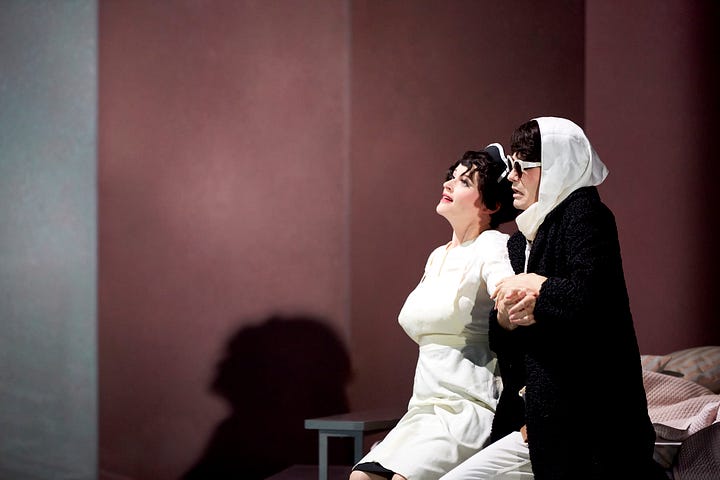

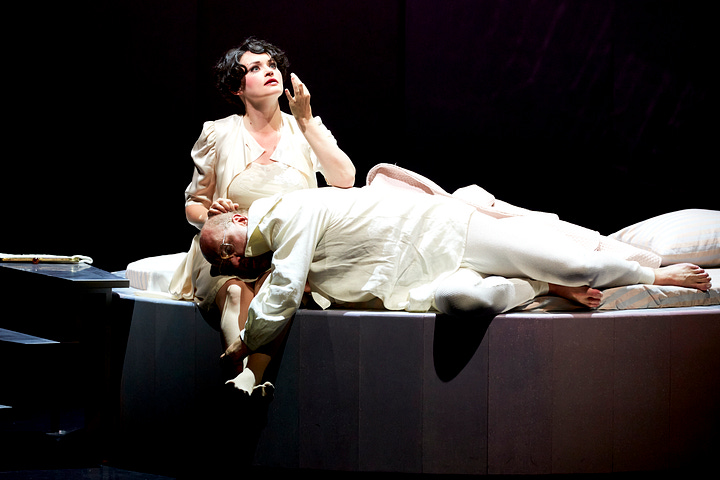
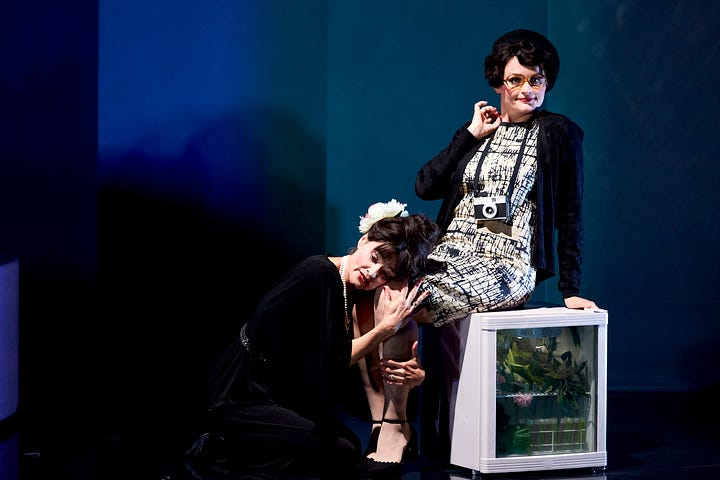
Surprisingly, what I found myself mulling over more often in this production was the Duchess's monologue during the eighth scene. It begins with the hotel manager announcing her eviction from the hotel, like a metaphorical Grim Reaper claiming a new soul: "The time to vacate always comes. And now it has come for you." And it is no wonder; her entire sense of self was wrapped up in wealth and status. It was as if losing her social class completely erased who she was. For someone whose experiences of love, kindness and personal attachment seemed to necessitate some sort of monetary transaction, it is not surprising then, that she speaks about loneliness only after her resources have all dried up. The eighth scene is the moment in the hero's journey where the protagonist, having been faced with a crisis, experiences a revelation, which begins the process of transformation. Though the orchestration at this point has been reduced to just a few instruments (a musical representation of her personal and financial nadir), the tension builds to make room for an epiphany. However, the Duchess cannot make this step, because she is obsessed only with reliving the past. Redemption, or "buying back" as defined by its etymology, is not possible for her, literally and figuratively. What is even worse, is that if she had made a transformation, it would negate all of the brilliant tango music and camp and parody that make this opera such an exceptional piece of art. Regardless of whether Powder Her Face was an interpretation of Margaret Campbell's internal world, or a semi-autobiographical account of her personal memories, it would be very easy to dismiss the recollections of someone like her as inflated and self-obsessed. But shouldn't we assume that to some extent, everyone's personal memories are shaped by what they value and how they would like to see themselves, much less by how they want to be remembered by others?
The timing of this production and performance period had been for me a welcome interruption from a world split apart by global health crisis and war. As a musician, considering this degree of human suffering, it is difficult not to ask oneself “To what end should anyone be performing under such circumstances?” The performing arts exist not only to help people understand themselves and the world they live in, but also to inspire empathy and self-reflection. At this moment in time, it is natural for individuals and communities to polarize as a defense mechanism. Tightening the categories of what is considered good and bad around us can help regain our sense of safety, control, and belonging. But when people become psychologically entrenched in oversimplified ideologies and identitarianism, anyone who lives outside of these belief camps becomes an abstraction, and not a human being with thoughts and needs and feelings. What Powder Her Face can bring to our attention - celebrity narcissism, society of spectacle, class resentment, female sexual liberation, the dark side of nostalgia - doesn't really matter. What is essential in regaining some sort of social equilibrium, is in exercising the muscle of embracing complexity and nuance. The state of "knowing better", however gratifying and comforting, is a superficial and distorted sense of reality in which to exist. How appropriate, if not a little ironic, to suggest then, that a superficial and distorted narrative such as Powder Her Face can offer us new cognitions, however dissonant, which can lead to a more authentic and comprehensive understanding of ourselves and others.
Director: Julien Chavaz
Conductor: Jérôme Kuhn
Nouvel Opéra Fribourg/Neue Oper Freiburg
Cast: Sophie Marriley (Duchess), Alison Scherzer (Maid), Graeme Danby (Hotel Manager), Timur (Electrician)


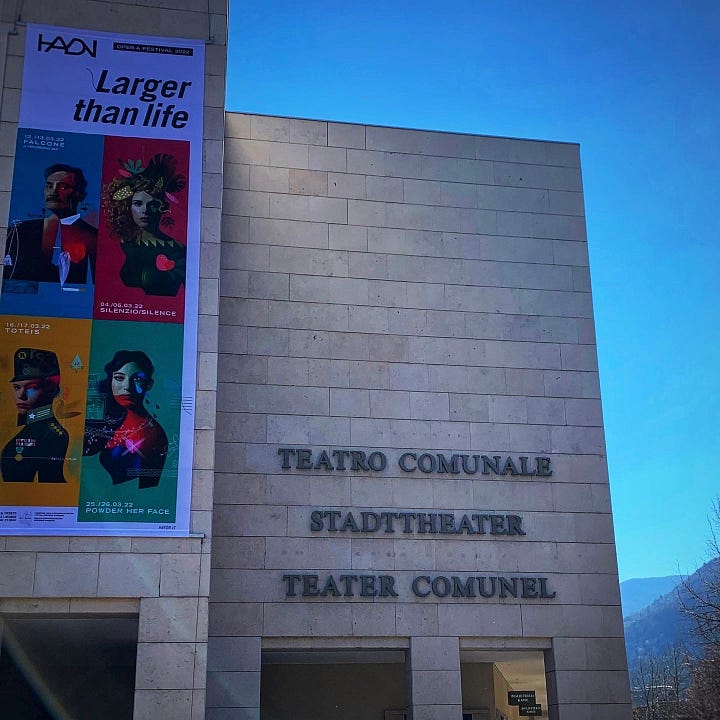
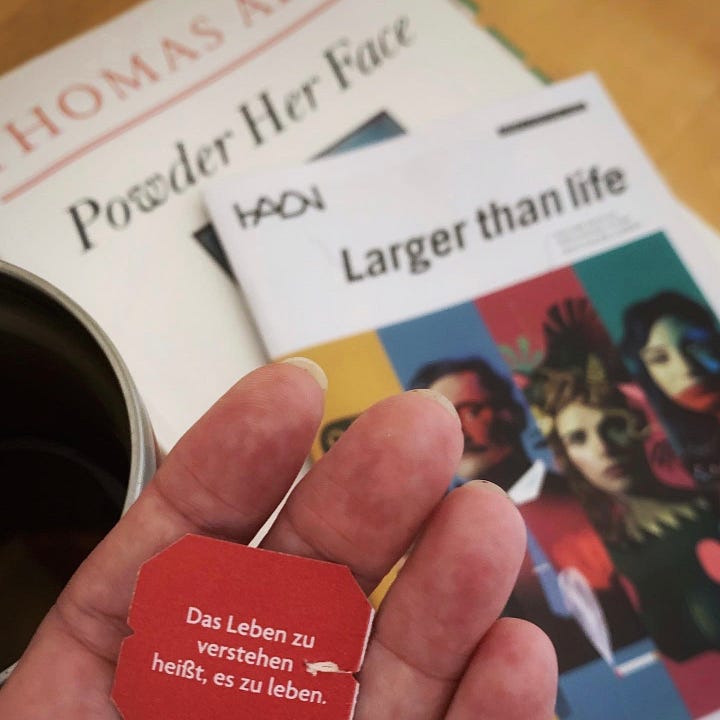
In the Press
« Powder Her Face », sexe et tragédie au royaume d’Adès, Pierre Gervasoni, le Monde
Un Powder Her Face délié à l’Athénée, Thibault Vicq, Opera Online
The Rise and Fall of the Duchess of Argyll, Michèle Tosi, Hémisphère son
Powder Her Face, opéra sans fard à l'Athénée, Olyrix
Powder Her Fesses, Alexandre Jamar, Forum Opera
Powder Her Face de Thomas Adès à l’Athénée - Ceci est bien une pipe — Compte-rendu, Laurent Bury, ConcertClassic.com
Room Service, David Verdier, Wanderer
Bolzano - Teatro Comunale: Powder Her Face, Martino Pinali, operaclick
Una disincantata ironia, Giulia Vannoni, il Ponte
OPER.A 2022 – Powder Her Face a Bolzano, Luca Benvenuti, non solo cinema
POWDER HER FACE - NOF, Nouvel Opéra Fribourg, Stéphanie Tschopp, La Batoille

